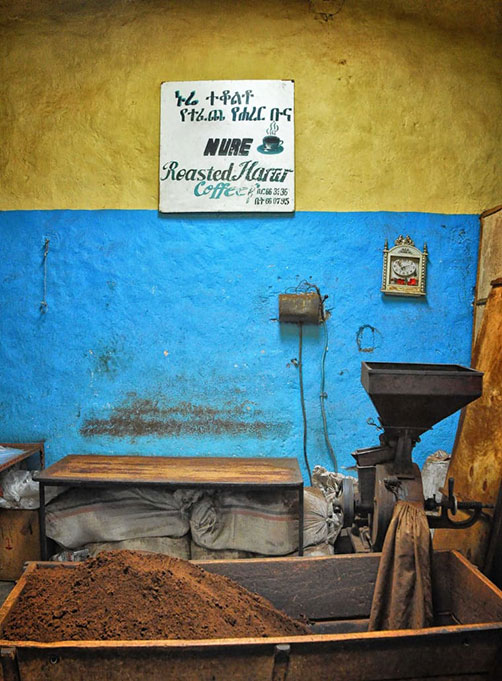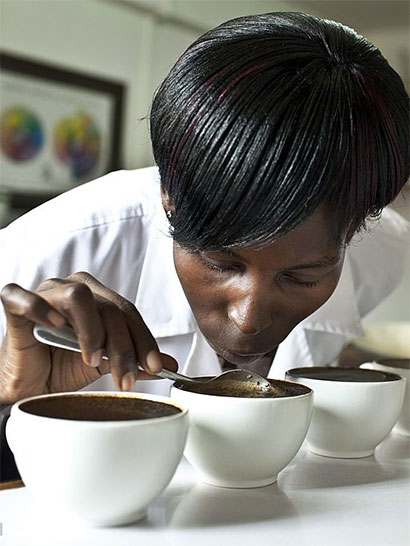Unlocking the secrets of African Coffee!

Coffee may be spread around the world by Arabs and espresso is an Italian invention, but the coffee plant was first developed in Ethiopia. Coffee tree is endemic to Ethiopia and Ethiopians were also the first people to use coffee beans, though quite different from what we know today.
Mama Africa: Coffee's deep roots
From Ethiopia, coffee flowed across the Arabian Peninsula and then, through trade, across Europe, while colonialism was responsible for spreading its cultivation in Southeast Asia and Latin America. Slowly, coffee cultivation has spread to all African states that are fortunate enough to belong to the "coffee belt", that is to say, stretching between the tropical Cancer and Capricorn and displaying appropriate climatic conditions for the development of coffee grounds. In some countries, however, coffee cultivation is marked by considerable fluctuations, both in quantity and quality, due to the ongoing civil wars plaguing the African continent.
There are not a few countries in which the cultivation of coffee (like cocoa) is a major pillar of their economy and a major export commodity. Coffee is mainly Arabica, but Robusta is also produced, although Asia remains a leader in this area. There are both large, organized plantations as well as small, family owned cooperative farms. African coffee is as diverse as Africa itself, as long as we consider that the coffee-producing countries are Ethiopia, Uganda, Ivory Coast, Kenya, Tanzania, Cameroon, Madagascar, Gabon, the Congo, Rwanda, Burundi, Togo, the Central African Republic, Nigeria, Ghana, Sierra Leone, Angola, Malawi, Zimbabwe, Liberia and Zambia.
 How does African Coffee taste like?
How does African Coffee taste like?
Initially, it is worth noting that African coffees may have some common characteristics in terms of their taste profile, but Africa is a vast, vast continent in which the "coffee belt" covers a significant part. The countries that produce coffee in Africa are over twenty and while some are undoubtedly leading players in the coffee world, such as Ethiopia or Kenya, there are other countries whose coffee is more difficult to find in the market, such as Angola , the Central African Republic or Madagascar.
There are also significant differences between coffees in the same country, depending on the individual characteristics of each variety and of course the cultivation and treatment conditions. However, if we want to summarize the characteristics of African coffees, their basic aromatic bouquet includes notes of flowers, fruits and citrus fruits. The taste of African coffee is light, with a natural sweetness to the finish, the body relatively balanced and the overall mouth feel intense and bright. Acidity is also a distinctive feature of Black Epirus coffee: African coffees are known for their shiny and sharp acidity, which can sometimes give the coffee an aftertaste that brings to mind tea or even wine.
Of course, all of the above applies to Arabica coffee, which is the protagonist of African coffees. In several African countries, such as in Cσte d'Ivoire, there is significant Robusta production, but it does not in any way reflect the characteristics we have in mind when talking about "African coffee", which refers to the more complex Arabica.
How one should enjoy African Coffee?
Each coffee can be extracted in all ways, but can also withstand different roasting profiles. It is a fact that African coffees are usually lighter roasted as their aromas are more pronounced. It is best to choose a trusted brand , as its roasting know-how is sure to give us the best results.
We can also try African coffee either as a single origin one(so we will explore its flavors to the fullest) or as part of some blend. African coffees add to the blend of acidity, pleasant, light aromas and balance out the more robust and full-bodied taste of Central American and Asian coffees. On the other hand, as African coffees do not have a strong body, mixing them with coffees of other origin can greatly enrich the field.
There is no proper extraction, as everything is a matter of personal taste. African coffee, both mono-varied and blended, gives excellent results as an espresso and as a filter coffee. In general, it does not particularly suit the milk because of its strong acidity, and usually does not need sugar to emerge.
Three african countries with special coffees
 Ethiopian Coffee: Fruits, Flowers and Notable Variety
Ethiopian Coffee: Fruits, Flowers and Notable Variety
Ethiopia is known for its hundreds of Arabica varieties found in its territories, giving diversity to the aromas and tastes of coffee. Ethiopian coffee usually has a pleasant acidity, depending on the variety of blossom notes (such as jasmine) or fruit aromas, such as blueberry and strawberry, which give the coffee a velvety syrup feel. Illy Monoarabica Ethiopia is an excellent opportunity to explore Ethiopian coffee: the beans come from the Yirgacheffe region and are characterized by gentle aromas that make this coffee unique.
Ιvory Coast: the next big thing in Robusta
Ivory Coast may be (along with Ghana) the world's largest cocoa producer, but it has a remarkable coffee performance, but notably Robusta. Although in the past the small African country was the largest producer of Robusta in the world, the political instability, civil strife and intensive cultivation of Robusta in Vietnam greatly reduced the production and quality of coffee. In recent years production has rebounded, both qualitatively and quantitatively, and many are talking about the new big name Robusta. Custte d'Ivoire Robusta is strong, strong, with clear earthy aromas and spice suspicions. The blends of Segafredo, Casa and Intermezzo, make use of this special Robusta coffee, which owes its spicy notes.
Κenya: The most unusual coffees available
The taste and aroma of an Arabica from Kenya is perhaps the most typical example of "exotic" coffee. The acidity is intense and at times "palatable", citrus and flower aromas are strong and the character of coffee is special. That is why Kenyan coffees have both fanatical friends and sworn enemies, as they carry special flavors that can excite and repel those who prefer different coffees.
Those who feel that coffee is more than just a drink have certainly started exploring the Black Epirus coffees, as for the rest, it's never too late. It is always important to drink the coffee we deserve!










